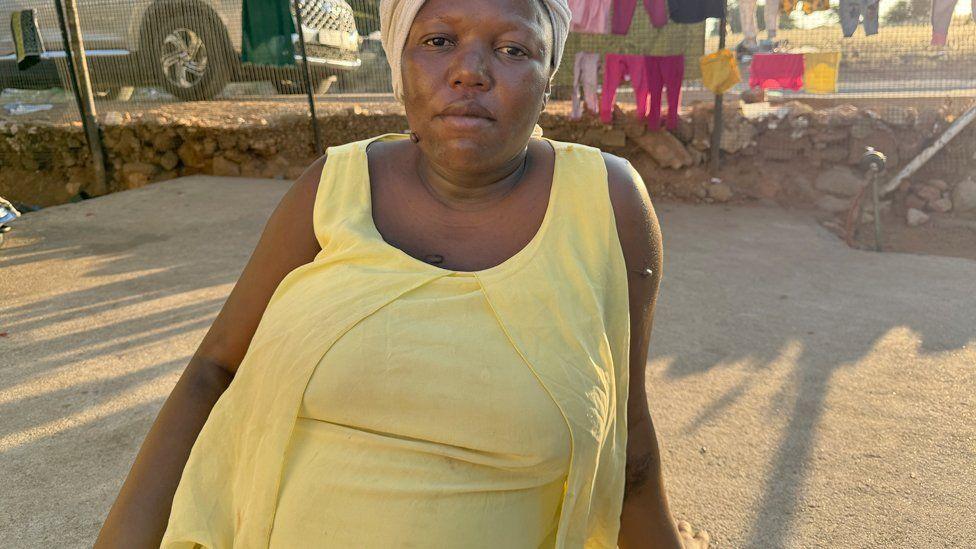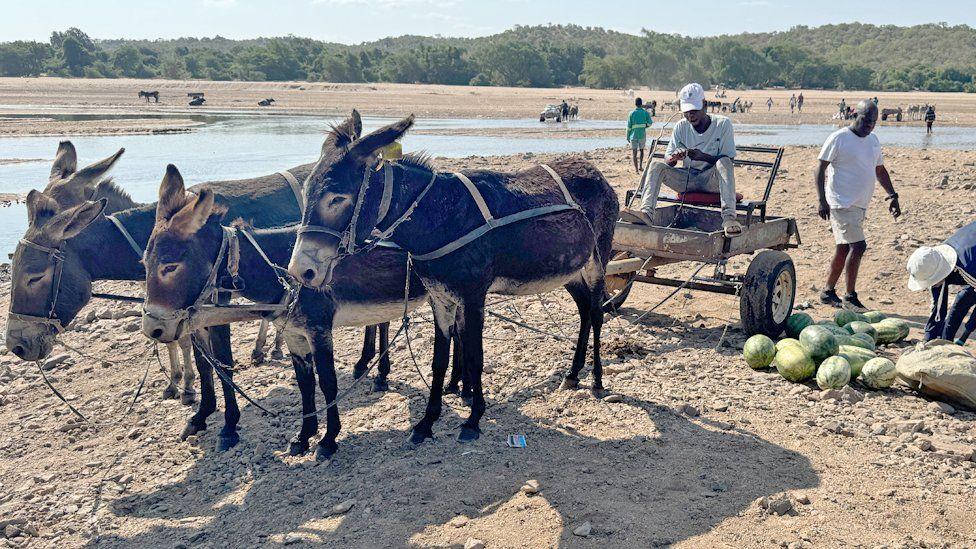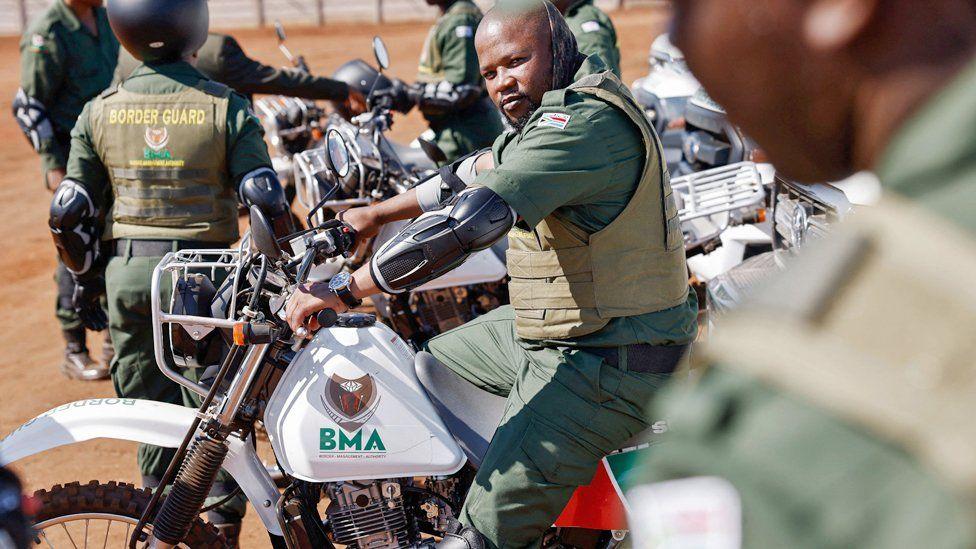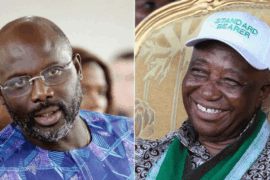
Many pipo wey dey migrate dey risk plenti tins to reach South Africa, dem dey make a veri dangerous journey across di border from Zimbabwe.
As dem dey run comot from poverty and desperation for anoda place for Africa, dem feel say no oda choice dey.
But as elections dey come, xenophobic sentiment don dey on di rise and South Africa goment dey under pressure to tighten di border.
Di men wey rape Portie Murevesi no care say she dey pregnant.
Dem attack her wit glass bottles too, as she tell us, and point to a large and jagged scar wey dey her forearm.

Now wey she go soon born her baby, she dey recova for one shelter wey one church dey run for di South African border town of Musina.
“Wen I try to sleep sometimes, I see wetin dose men do me,” she tell di BBC.
Musina dey well known as place of refuge for migrants like Ms Murevesi, wey enta di border unnoticed.
Di migrants wey make am don survive difficult trek through di bush. Na lawless and unforgiving territory. Wild animals and gangs of criminals na constant threats.
Stories of tiff tiff, beatings, rapes and even killings dey common.
“E dey veri veri dangerous.” one Zimbabwean man tok. E only give im name as George.
“You go see skeletons, you go see pesin wey dem don kill two or three months ago,” e tok about im own crossing.
We meet am as night fall for Musina and groups of men bin return to one dingy compound of tin-roofed huts.
Di lucky ones don find some casual work for town, and dem dey earn little cash to send back to dia families for neighbouring kontris.
One explain: “We no fit go back to Zimbabwe sake of say notin dey dia. We dey starve. Food no dey.”
Nobodi know for sure how many undocumented migrants live under di radar of di authorities for South Africa, di most advanced economy for Africa.
Di last census find say more dan 2.4 million foreigners wey dey live for di kontri. Half of dem na Zimbabweans – dem account for just ova 3% of di population.
But official estimates for di number of dose wey enta illegally no dey.
And wit a general election wey dem scheduled for di end of May, illegal immigration don become a highly charged political issue.
Di South African authorities say dem dey tight border security.
We see for oursef how big di task be.
Along di road from Musina towards di Limpopo River, wey separate South Africa and Zimbabwe, you go see coils of metal for di undergrowth.
Na di remains of a border fence: flimsy, piecemeal, trampled.

Na little water dey inside di river. And heat too much, dozens of pipo bustle back and forth across one invincible border.
Donkeys drag carts wit good across di cracked riverbed.
Women wey balance stacks of packages on dia heads hurry alongside.
Dem tell us say e take about five minutes to walk from di nearest Zimbabwean village into South Africa.
And notin dey – no fence, no guards to stop dem.
John wey ask us to change im name to protect im identity sit on im cart, occasionally twitch at im restless donkey. Watermelons bin dey piled up on di wagon.
E get family for house in Zimbabwe, im tell us. But jobs no dey dia, enough food no dey. So now e dey grow di melons and bring dem ova to sell for South Africa, where di price high.
“I do dis to survive,” e tok.
Na thriving, illicit, cross-border marketplace. While di migrants wey cross here dey face serious trek to Musina, most of di goods dey shifted back and forth by cart or car.
Occasionally, John tell us, sojas arrive and make arrests. But advance warning dey usually dey, e add, and e dey easy but risky to melt into di bush.

But di South African goment wan take back control. Last year President Cyril Ramaphosa officially launch one new border force.
Mike Masiapato, di commissioner of di Border Management Authority (BMA), tell us say im dey send 400 newly trained officers to di border and procuring drones, bodi cams and motorbikes to improve surveillance.
“I fit assure you now say di current leadership of di kontri understand di criticality of dis work.”
But even Mr Masiapato acknowledge say e go take time to really secure di kontri border.
“We don start to fortify di environment. Hopefully for di next few years we suppose dey able to succeed.”
Di kontri govning party, di African National Congress (ANC), fit no get years.
Afta three decades for power, di ANC preside ova a kontri wia power and water supplies dey fail and wey citizens dey face high levels of unemployment and violent crime.
As South Africa dey near election wey poll predict say no go favour ANC, e no dey surprising say some political opponents – like di anti-migrant party Operation Dudula – openly blame migrants for di kontri wahala.
And xenophobic rhetoric dey widespread, wit migrants also blamed for taking jobs from locals.
Even President Ramaphosa don tok say undocumented foreign nationals worsen South Africa social and economic problems
And oda opposition parties dey demand stronger controls, including ActionSA, wey Herman Mashaba form four years ago. Mashaba na outspoken politician and former mayor of Johannesburg.
“Di ANC goment don fail our pipo terribly,” regional spokeswoman for ActionSA Malebo Kobe tok.
Ms Kobe, wey we meet for di Zimbabwe border, tok say illegal immigration top di list of voter concerns for di area.
She warn say local hospitals and oda services don dey overwhelmed by undocumented migrants wey come here to seek healthcare or oda benefits.
“E go dey offensive make we no even speak about di reality of wetin e dey do to our public systems wen pipo no pay taxes, but expect to live and benefit from di goods and services wey our goment dey provide.”
Even as South Africa prepare – maybe – to redraw dia political map, wetin pipo need and dia desperation dey continue to define dis kontri limits.










